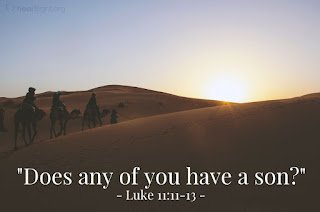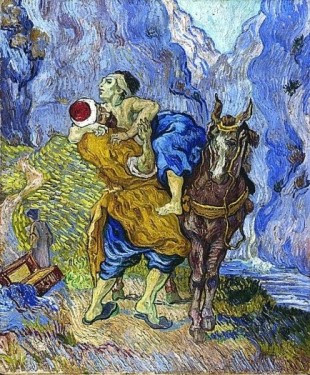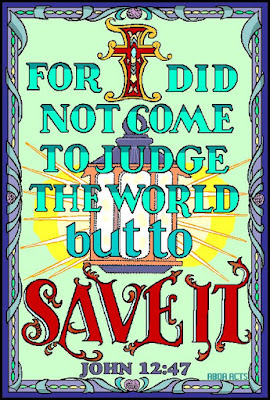PRAYER TAUGHT AND ENCOURAGED
(Probably Judea)
LUKE 11:1-13
Overview: After Jesus was praying in "a certain place," one of his disciples requests that he teach them how to pray.
First some background on Jewish prayer customs:
"It was customary for the rabbis to give their disciples forms of prayer, and [John] the Baptist seems to have followed this practice, though the prayer taught by him appears soon to have been forgotten." -Fourfold Gospel
"Dr. Lightfoot's notion of this is, That whereas the Jews' prayers were generally adorations, and praises of God, and doxologies, John taught his disciples such prayers as were more filled up with petitions and requests; for it is said of them that they did deēseis poiountai - make prayers, Luk_5:33. The word signifies such prayers as are properly petitionary." -Matthew Henry
"Idle repetition of prayers is forbidden; but persistence and importunity are encouraged.Gen. 18:23-33 [Abraham prays for Sodom & Gommorah; Matt. 15:27, 28, the Canaanite woman who requests her daughter to be healed]" -Fourfold
"The first parable concerns persistence in prayer. It is common in Luke for good lessons to be taught from bad examples (cf. Luk_16:1-9; Luk_18:1-8). In contrast with the man who did not want to be bothered, God wants His people to pray to Him (Luk_11:9-10). So Jesus encouraged people to be persistent in prayer - not to change God’s mind but to be steadfast in praying and to receive their needs."-BKC
"It is a declaration of the condition of our receiving any good gift from God. For reasons which may not be fully intelligible to us, God has limited His mercy. There is the treasure-house full of grace."-G. S. Barrett
"The prophet Hosea, describing that night of wrestling of Jacob with God, uses these words—you will find them in the Revised Version—“In his manhood he had power with God.” Do you know what that power was? It was the power of a lame man wrestling in prayer—“I will not let Thee go until Thou bless me.” It was the power that every soul in prayer has with God to-day." -G. S. Barrett
"Observe that these varieties of prayer are put on an ascending scale. “Ask”—the statement of our wants. “Seek” signifies that we marshall our arguments. “Knock”—importunity." BI
JESUS TESTIFIES TO THE FACT THAT PRAYER IS HEARD -C. H.Spurgeon
Asking and seeking must be continuous if they are to be rewarded.-MacLaren
Fathers do not play tricks with their hungry children. Though we are all sinful, parental love survives, and makes a father wise enough to know what will nourish and what would poison his child.-MacLaren
Luke’s version of the closing promise, in which ‘the Holy Spirit’ stands instead of Matthew’s ‘good things,’ sets the whole matter in the true light; for that Spirit brings with Him all real good, and, while many of our desires have, for our own sakes, to be denied, we shall never hold up empty hands and have to let them fall still empty, if we desire that great encyclopediacal gift which our loving Father waits to bestow. It cannot be given without our petition, it will never be withheld from our petition. -MacLaren
Our heavenly Father’s love, the archetype of all parental affection, is tainted by no evil and darkened by no ignorance. He loves perfectly and wisely, therefore He cannot but give what His child needs.-MacLaren
"Notice that how much more! Count the stars scattered on the vault of night, or the daisies in the fields, or the myriads of living creatures, sustained as the pensioners of His bounty, and ask yourself if He cannot give enough good gifts, and His Spirit withal, to supply all your need. What would you not do for your helpless little child? “How much more…”" -F.B. Meyer
 "And my God will supply every need of yours according to his riches in glory in Christ Jesus."
"And my God will supply every need of yours according to his riches in glory in Christ Jesus."Philippians 4:19
Because of his importunity, he will rise. The one idea left upon the minds of the hearers of this little quaint homely parable is—importunity is completely successful. The borrower had only need to keep on knocking to get all he wanted. -Pulpit
The point made by Dean Vaughan below is significant--to think of prayer as speech and to think of the value, purpose, and effects of our speech:
"It is made in Scripture both the duty and also the test of a Christian, that his speech be not only innocent, but beneficial; not only kind and frank, but consistent also and edifying." -Dean Vaughan, BI
Prayer is speech. In our culture, the highlighted purpose of our speech is often to express our opinions or feelings and the unspoken assumption is that the speaking itself is of value for both the speaker and the listener, though this is not necessarily the case. Our younger culture has shifted to sharing visual images as frequently as words. Again, what is the purpose of these images?
According to Vaughan, as Christians, our sharing should be:
innocent
beneficial
kind
frank
consistent
edifying










